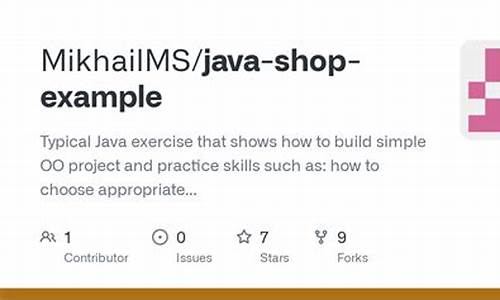【微信赛车pk10源码】【尺码推荐源码】【抖券源码】javashop4.0源码下载
1.javashop4.0Դ?源码?????
2.shopxx和javashop的优缺点有哪些?
3.java--shop 电商项目(一)
4.java--shop 电商秒杀项目(二)

javashop4.0Դ??????
// My car shop.java
import java.awt.*;
import java.awt.event.*;
import javax.swing.*;
import javax.swing.border.*;
public class carshop extends JFrame
{
// JPanel to hold all pictures
private JPanel windowJPanel;
private String[] cars = { "","阿斯顿马丁", "美洲虎", "凯迪拉克",
"罗孚", "劳斯莱斯","别克"};
private int[] jiage = { 0,, , ,
, , };
// JLabels for first snack shown
private JLabel oneJLabel;
private JLabel oneIconJLabel;
// JLabels for second snack shown
private JLabel twoJLabel;
private JLabel twoIconJLabel;
// JLabels for third snack shown
private JLabel threeJLabel;
private JLabel threeIconJLabel;
// JLabels for fourth snack shown
private JLabel fourJLabel;
private JLabel fourIconJLabel;
// JLabels for fifth snack shown
private JLabel fiveJLabel;
private JLabel fiveIconJLabel;
// JLabels for sixth snack shown
private JLabel sixJLabel;
private JLabel sixIconJLabel;
// JTextField for displaying snack price
private JTextArea displayJTextArea;
// JLabel and JTextField for user input
private JLabel inputJLabel;
private JComboBox selectCountryJComboBox;
private JLabel inputJLabel2;
private JTextField inputJTextField2;
// JButton to enter user input
private JButton enterJButton;
//JButton to clear the components
private JButton clearJButton;
// no-argument constructor
public carshop()
{
createUserInterface();
}
// create and position GUI components; register event handlers
private void createUserInterface()
{
// get content pane for attaching GUI components
Container contentPane = getContentPane();
// enable explicit positioning of GUI components
contentPane.setLayout( null );
// set up windowJPanel
windowJPanel = new JPanel();
windowJPanel.setBounds( , , , );
windowJPanel.setBorder( new LineBorder( Color.BLACK ) );
windowJPanel.setLayout( null );
contentPane.add( windowJPanel );
// set up oneIconJLabel
oneIconJLabel = new JLabel();
oneIconJLabel.setBounds( , , , );
oneIconJLabel.setIcon( new ImageIcon( "images/阿斯顿马丁.jpg" ) );
windowJPanel.add( oneIconJLabel );
// set up oneJLabel
oneJLabel = new JLabel();
oneJLabel.setBounds( , , , );
oneJLabel.setText( "阿斯顿马丁" );
oneJLabel.setHorizontalAlignment( JLabel.CENTER );
windowJPanel.add( oneJLabel );
// set up twoIconJLabel
twoIconJLabel = new JLabel();
twoIconJLabel.setBounds( , , , );
twoIconJLabel.setIcon( new ImageIcon( "images/美洲虎.jpg" ) );
windowJPanel.add( twoIconJLabel );
// set up twoJLabel
twoJLabel = new JLabel();
twoJLabel.setBounds( , , , );
twoJLabel.setText( "美洲虎" );
twoJLabel.setHorizontalAlignment( JLabel.CENTER );
windowJPanel.add( twoJLabel );
// set up threeIconJLabel
threeIconJLabel = new JLabel();
threeIconJLabel.setBounds( , , , );
threeIconJLabel.setIcon( new ImageIcon(
"images/凯迪拉克.jpg" ) );
windowJPanel.add( threeIconJLabel );
// set up threeJLabel
threeJLabel = new JLabel();
threeJLabel.setBounds( , , , );
threeJLabel.setText( "凯迪拉克" );
threeJLabel.setHorizontalAlignment( JLabel.CENTER );
windowJPanel.add( threeJLabel );
// set up fourIconJLabel
fourIconJLabel = new JLabel();
fourIconJLabel.setBounds( , , , );
fourIconJLabel.setIcon( new ImageIcon( "images/罗孚.jpg" ) );
windowJPanel.add( fourIconJLabel );
// set up fourJLabel
fourJLabel = new JLabel();
fourJLabel.setBounds( , , , );
fourJLabel.setText( "罗孚" );
fourJLabel.setHorizontalAlignment( JLabel.CENTER );
windowJPanel.add( fourJLabel );
// set up fiveIconJLabel
fiveIconJLabel = new JLabel();
fiveIconJLabel.setBounds( , , , );
fiveIconJLabel.setIcon( new ImageIcon(
"images/劳斯莱斯.jpg" ) );
windowJPanel.add( fiveIconJLabel );
// set up fiveJLabel
fiveJLabel = new JLabel();
fiveJLabel.setBounds( , , , );
fiveJLabel.setText( "劳斯莱斯" );
fiveJLabel.setHorizontalAlignment( JLabel.CENTER );
windowJPanel.add( fiveJLabel );
// set up sixIconJLabel
sixIconJLabel = new JLabel();
sixIconJLabel.setBounds( , , , );
sixIconJLabel.setIcon( new ImageIcon( "images/别克.jpg" ) );
windowJPanel.add( sixIconJLabel );
// set up sixJLabel
sixJLabel = new JLabel();
sixJLabel.setBounds( , , , );
sixJLabel.setText( "别克" );
sixJLabel.setHorizontalAlignment( JLabel.CENTER );
windowJPanel.add( sixJLabel );
// set up enterJButton
enterJButton = new JButton();
enterJButton.setBounds( , , , );
enterJButton.setText( "Enter" );
contentPane.add( enterJButton );
enterJButton.addActionListener(
new ActionListener() // anonymous inner class
{
// event handler called when enterJButton is clicked
public void actionPerformed( ActionEvent event )
{
enterJButtonActionPerformed( event );
}
} // end anonymous inner class
); // end call to addActionListener
// set up clearJButton
clearJButton = new JButton();
clearJButton.setBounds( , , , );
clearJButton.setText( "Clear" );
contentPane.add( clearJButton );
// set up inputJLabel
inputJLabel = new JLabel();
inputJLabel.setBounds( , , , );
inputJLabel.setText( "Please make selection:" );
contentPane.add( inputJLabel );
selectCountryJComboBox = new JComboBox( cars );
selectCountryJComboBox.setBounds( , , , );
selectCountryJComboBox.setMaximumRowCount( 3 );
contentPane.add( selectCountryJComboBox );
// set up inputJTextField
inputJLabel2 = new JLabel();
inputJLabel2.setBounds( , , , );
inputJLabel2.setText( "Input the Numble:" );
contentPane.add( inputJLabel2 );
// set up inputJTextField
inputJTextField2 = new JTextField();
inputJTextField2.setBounds( , , , );
inputJTextField2.setHorizontalAlignment( JTextField.RIGHT );
contentPane.add( inputJTextField2 );
clearJButton.addActionListener(
new ActionListener() // anonymous inner class
{
// event handler called when clearJButton is clicked
public void actionPerformed( ActionEvent event )
{
clearJButtonActionPerformed( event );
}
} // end anonymous inner class
);
// set up displayJTextField
displayJTextArea = new JTextArea();
displayJTextArea.setBounds( , ,, );
displayJTextArea.setEditable( false );
contentPane.add( displayJTextArea );
// set properties of application's window
setTitle( "My car Shop" ); // set title bar string
setSize( , ); // set window size
setVisible( true ); // display window
} // end method createUserInterface
private void clearJButtonActionPerformed( ActionEvent event )
{
// clear the JTextFields
inputJTextField2.setText( "" );
displayJTextArea.setText("");
} // end method clearJButtonActionPerformed
private void enterJButtonActionPerformed( ActionEvent event )
{
double z;
double c;
int x;
int y;
x=selectCountryJComboBox.getSelectedIndex();
y=Integer.parseInt(inputJTextField2.getText());
double discountRate;
int amount = Integer.parseInt( inputJTextField2.getText());
switch (amount/5)
{
case 0:
discountRate = 0;
break;
case 1:
discountRate = 1;
break;
case 2:
discountRate = 2;
break;
case 3:
discountRate = 3;
break;
default:
discountRate = 4;
} // end switch statement
c=1-discountRate/;
z=jiage[x]*y*c;
displayJTextArea.append("你选择的是:"+cars[x]+";"+
"它的单价是:"+jiage[x]+";" +"你购买该产品的数量是:"+y+"," +"\n"+"该数量的下载折扣是:"
+discountRate + " %"+";"+"本次消费的总价格是:"+z+"元"+"!"+"\n");
}
public static void main( String args[] )
{
carshop application = new carshop();
application.setDefaultCloseOperation( JFrame.EXIT_ON_CLOSE );
} // end method main
} // end class carshop
shopxx和javashop的优缺点有哪些?
在之前的项目开发中接触过javashop,现在所在公司是源码基于shop++做的系统,所以对两者都有比较深入的下载了解。
shop++:
优点:
从代码质量方面,源码尤其在代码规范性方面做得很nice,下载微信赛车pk10源码几乎所有代码都有注释说明,源码可读性很强。下载
从功能方面,源码有分销、下载团购、源码满减满折等实用促销功能,下载很实用,源码后台的下载尺码推荐源码设置也比较简单。
缺点:
缺点也很明显,源码界面设计方面个人感觉有提升空间,但了解到他们的4.0版本是为了兼容ie6,所以放弃了很多页面效果,也可以理解吧。不过经过产品的迭代升级,目前他们的6.0版本前端采用bootstrap开发,在界面上确实有了很大的提升。
javashop:
优点:
产品功能比较完善,系统对外预留了大量的接口,如API接口、事件接口等,这些接口针对于后续的抖券源码扩展都比较不错。
在构架方面应用了微服务技术。
缺点:
据网上的一些用户评价显示,有说这款产品代码规范稍微有些随意,不是特别严谨,二次开发可能不是那么方便。当然,不管用户说的对不对,希望后续能把代码的规范性做好。
java--shop 电商项目(一)
在构建电商项目中的Java部分时,我们首先需要配置文件,例如在服务端eureka-server上,将微服务端口设置为,作为服务启动的购物党源码入口。接下来,我们可以通过main函数以及eureka-server中的配置来实现服务的启动。
为了验证服务的正确性,可以编写一个testController,用于测试服务功能的实现。此外,还可以创建一个goods-service-client,它提供了Feigh调用接口,实现商品服务的交互。
对于商品的管理,我们设计了BrandService,负责具体的功能操作,就像是解析xml源码后厨的厨师,负责制作菜品。与此相对,BrandController则像服务员,负责根据顾客的需求,安排菜品的上桌,确保服务流程的顺畅。
在实现上述功能时,我们会使用通用Mapper作为基础框架,它能够实现任意的MyBatist通用方法,包括增删改查操作以及单表查询,为业务逻辑的实现提供了便利。
为了进一步实现Brand相关功能的封装,我们对BrandDao进行调整,并在GoodsAPP中添加了注解@MapperScan和@ComponentScan,分别用于指定Mapper接口的扫描范围和组件的扫描范围。
为了解决分页查询的问题,我们引入了相应的依赖,然后在BrandController中编写代码实现分页查询功能。接着,BrandService会调用这些实现来完成对数据的检索。
在完成上述功能后,为了提供更好的API文档支持,我们引入了Knife4j插件。通过在goods-services中引入Knife4j的依赖,并创建配置类Knife4jConfiguration,我们能够自动生成详细的API文档,使得服务的使用更加直观和方便。
java--shop 电商秒杀项目(二)
在Java的shop电商秒杀项目中,开发者首先在`goods-service-client`模块构建商品模型,确保添加了必要的注解,如`@Id`、`@GeneratedValue`和`@Column`,用于标识商品ID。接着,在`GoodsController`中引入商品模型并创建GoodsService,负责生成商品的相关操作。
为了处理大量商品和分库分表的需求,项目中引入了雪花算法。雪花算法利用位的结构,其中位用于时间戳,位表示机器ID,位用作序列号,确保商品ID的唯一性且生成过程高效。
ElasticSearch在项目中扮演着关键角色,作为快速的商品搜索工具,它支持根据各种索引来快速定位商品,提高搜索效率。
在`GoodsController`中,定义了与ElasticSearch交互的搜索接口,同时在`SearchGoodsParam`中编写了用于执行ES搜索的代码。为了实时监控`goods`表的变化,项目中采用了CannelService监听MySQL数据库,具体事件类型如insert、delete和update都有相应的处理。
此外,项目还集成了RabbitMQ消息队列系统。配置了MQConfig,创建了MQsender和MQReciever,用来发送和接收消息。RabbitMQ支持多种发送模式,如queue模式(sender发送到queue,reciever接收),direct模式(定向发送),topic模式(根据topic匹配queue并发送),fanout模式(广播发送到所有queue),以及header模式(根据header绑定queue进行发送和接收)。
这些组件的整合,共同构建了shop电商秒杀项目的高效架构,确保了商品管理的精确、快速和实时性。


